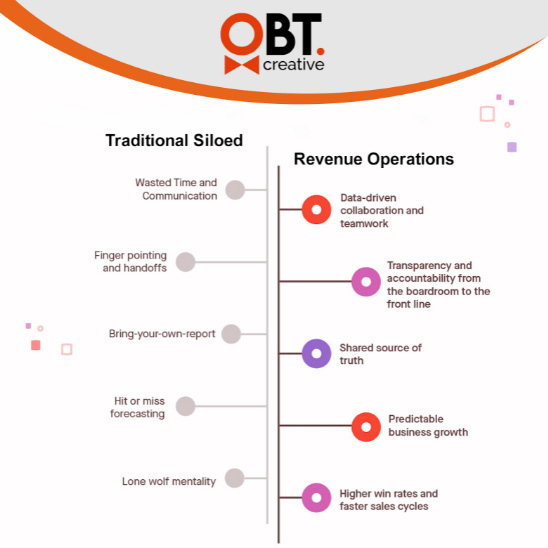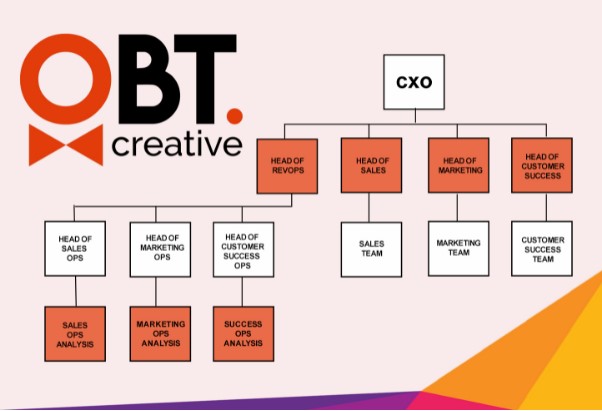“Great things in business aren’t done by a single person. They’re done by a team of like-minded individuals.”
– Steve Jobs
Companies with aligned revenue-generating departments and a dedicated revenue operations team are 34% more profitable than their peers. These days, we’ve seen an ever-increasing need for accountability, transparency, and predictability. The digital revolution has transformed the way consumers interact with businesses. In today’s digital era, people have access to a world full of information at the tip of their hands.
They carry out their own research before engaging with one of the company’s sales executives. 86% of consumers are willing to pay more for a memorable customer experience. As a result, building a strong customer success team has become extremely crucial.
Traditional siloed-structured organizations are often subject to:
- Higher Customer Acquisition Costs
- Poor Customer Experience
- Higher Operational & Tech Spending
- Lack of Collaboration & Serious Disagreements
- Disconnected & Outdated Revenue Data Leading to Inaccuracies & Inefficiencies Across Revenue Team
- And more!
If you want to drive success, align the different revenue-generating departments throughout the entire funnel.
This has resulted in a serious rise in worldwide RevOps adoption.
A few of the benefits of this model include:
- Increased High-Ticket Product or Service Sales
- Tightly Aligned Technology Stack
- Accurate Decision Making
- No Misalignment Between Different Departments
- Enhanced Measurement
Not familiar with RevOps? Our team has done an outstanding job explaining the concept in a clear yet concise manner. Click HERE to take yourself to the realm of RevOps.
Aligning different departments have helped businesses generate 209% higher revenue from marketing.
But if you want to achieve the desired results, you need to do it right.
Companies with strong alignment achieve a 20% annual growth rate. But the ones that don’t do it right witness a 4% revenue decline.
Why Should You Build a Dedicated Revenue Operations Team?
An efficient and dedicated Revenue Operations team will address your company’s existing workflow. The team members will process roadblocks and build a fool-proof strategy to maximize revenue.
One of their primary goals is to understand the customers at different stages of their buyers’ journeys. Doing this helps them ensure that the company is delivering a memorable customer experience.
The RevOps team members serve as strategists and liaisons across different revenue-generating departments.
They look at the bigger picture. Their primary aim isn’t just to bring the different departments and their tech stacks under a single roof. Instead, they examine different teams’ individual goals, data, strategy, actions, and metrics.
Based on that, they prepare accurate reports to enhance the decision-making process and forecast revenue.
Incorporating RevOps into your existing business model isn’t a one-day task.
Initially, you’ll be appointing single operations leader per division. These leaders will be responsible for aligning the revenue-generating departments. But, as you move forward, you’ll be required to make the transition to an entire division or a team dedicated to RevOps framework. Thinking about how to build a revenue operations team? Let’s look at the RevOps team structure.
Revenue Operations Team Structure
While building a dedicated RevOps team, the first thing you should consider is your company’s size. Large businesses can always hire additional talent. The same isn’t the case with small businesses. They don’t have the much-needed funding to hire more people. So, what they can do is appoint current operations managers for RevOps related tasks.
A dedicated Revenue Operations team can be categorized into:
- RevOps Lead
- Operations Management Team
- Enablement Team
- Insights Team
- Tools Team
RevOps Lead
RevOps Lead should be the subject-matter expert. This person will be the first point of contact for different departments. Some of the responsibilities of a RevOps Lead include:
- Deciding on Business Strategies & Objectives to Drive Revenue
- Aligning the Revenue Goals of Different Departments with the Company Goals
- Identifying Ways to Evaluate Analytics & Delivering Them to the Executive Teams
- Working Directly with the Executive Team for Determining & Influencing Objectives/Initiatives of the Company
- Managing Different Business Integrations, Subscriptions & Tools
- Implementing Operating Engagement Rules Across Different Teams
- Creating Processes to Create a Culture of Collaboration
- Engaging with the Leads of Individual Teams
Operations Management Team
An operational management team will be responsible for managing resources. Their main aim is to make sure that the outcome of revenue-related and customer-facing operations aligns with the business’ needs. They will distribute them based on the organizations’ revenue objectives and goals. Here’s what they’ll be responsible for:
- Project Management
- Sales & Marketing Operations
- Sales Planning
- Process Improvement
- Team Collaborations
Enablement Team
A sales enablement team ensures efficiency across different departments. They’ll be the ones responsible for the knowledge training sessions and onboarding new employees.
The team members will bring together the content, tools, information, and practices for different departments. Here’s what they’ll do:
- Learning Management
- Sales Enablement
- Performance Management
Insights Team
This team will align metrics submitted by different revenue-generating departments. On top of this, they’ll optimize the data for better decision-making.
This data will be passed onto the RevOps lead, who will report it to the executive team.
Their roles and responsibilities include:
- Monitoring Operations
- Tracking Metrics
- Managing Data Quality
- Developing Strategic Insights for Meeting Business Goals
Tools Team
This team will manage the tech stacks used by different revenue-generating departments. Also, they’ll align the tech stacks to reduce unnecessary costs and optimize the processes.
Their core responsibilities include:
- Evaluate Existing Tech Stacks
- Integrate Tech Stacks
- Systems Administration
- Address the Tech Needs of Different Revenue Departments
Build Your Revenue Operations Team Today!
We’ve seen most organizations getting all confused and unable to figure out how to build a RevOps team.
The truth is: you can’t build a Revenue Operations team overnight.
You need to start slow.
Firstly, identify the gaps in your existing funnel.
For example, if you want to scale your business yet are struggling with compensation model, territory model, or sales structure, then you need an operations management team.
If you’re struggling with sales process design, SLA compliance, stage usage, then prioritize the building enablement team. However, if you aren’t even able to identify your gaps, you need to build an insights team immediately. If there are any gaps with integrations or process flow, build a tools team today.
Building a Revenue Operations team is no small task. So, the first thing you need to identify is your business size. Alongside this, prepare a list of the gaps that are impacting revenue growth.
And use this to bring together a RevOps team.
While you can always hire an internal RevOps team, it’s costly and requires you to allocate a world full of resources.
To turn the process even simpler, consider outsourcing your RevOps to dedicated experts.
Our experts at OBT Creative build a highly converting revenue operations system to drive higher revenue. In simpler words, we are the Revenue Operation experts. Our experts will improve predictability, efficiency, and growth across the complete revenue process.
So, what are you waiting for?
Build your Revenue Operations Team Today!
And if you’re craving for more, click HERE to download our “The Most Comprehensive Revenue Operations Guide.”





